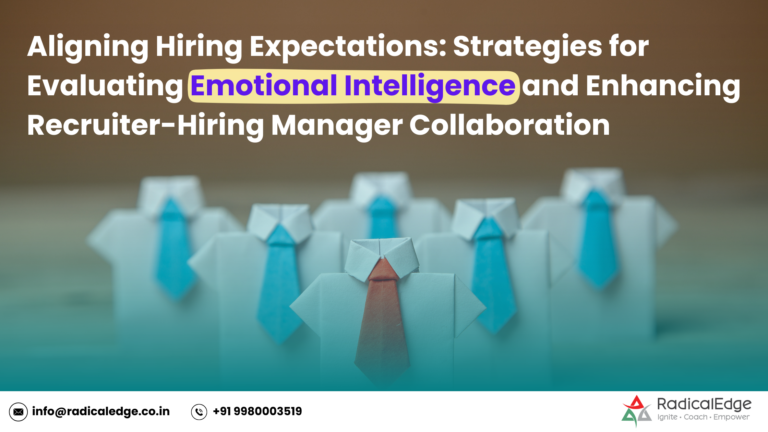A decade ago while working in an MNC a senior leader was recruited based on his performance and strategic abilities.
He was well-known in the market for driving business quickly and turning any business around. However, within a few months of joining the firm, there is a steady exit of existing team members and the business was hit badly.
What happened?
Peter Drucker says “Culture eats strategy for breakfast”, no matter how well-designed the strategic plan is, it will fall flat unless you have your team beside you.
One way of understanding people and connecting with them is by being an emotionally intelligent leader. In the ever-evolving landscape of the modern workplace, the significance of Emotional Intelligence (EI) has become increasingly evident. As employers seek candidates who not only possess the necessary technical skills but also the ability to navigate complex social dynamics, understanding and leveraging EI in the hiring process has become paramount.
This guide explores the crucial role of Emotional Intelligence in hiring and provides employers with insights on how to identify and nurture this essential trait in potential candidates.
What is Emotional Intelligence
Emotional Intelligence refers to the ability to recognize, understand, and manage one’s emotions effectively, while also being attuned to the emotions of others. It comprises a range of skills, including self-awareness, self-regulation, empathy, motivation, and social skills. In the workplace, these skills are invaluable for fostering collaboration, resolving conflicts, and promoting a positive and inclusive organizational culture.
The Impact of EI on Workplace Success
Numerous studies have shown that individuals with high Emotional Intelligence are more likely to succeed in their professional endeavors. They excel in areas such as leadership, teamwork, communication, and adaptability. Employers increasingly recognize that technical expertise alone does not guarantee success; candidates with strong EI bring an additional layer of interpersonal skills that can enhance team dynamics and contribute to a thriving work environment.
Identifying EI in Candidates
During the hiring process, employers must assess a candidate’s Emotional Intelligence alongside their technical qualifications. Here are some strategies to identify EI in potential hires:
- In the initial screening, they use an EI psychometric assessment to help identify candidates with high EI.
- Then to assess the shortlist, candidates are interviewed or complete role-play-based simulations.
- Successful candidates are then on-boarded with an emotional intelligence self-assessment to introduce them to expected behaviors.
- Followed by confirmation to ensure the employees are demonstrating EI sufficiently in the business using a 180° or 360° assessment.
Refer to this link for the case study video:
Emotional Intelligence in Recruitment – Genos International
Nurturing EI in the Workplace:
Once hired, employers play a crucial role in fostering and developing Emotional Intelligence in their teams. This can be achieved through:
1. Training Programs: Offer workshops and training sessions focused on emotional intelligence skills such as active listening, conflict resolution, and empathy.
2. Mentorship Programs: Pair employees with mentors who exemplify strong emotional intelligence. Learning from experienced individuals can significantly impact an employee’s development in this area.
3. Open Communication: Foster an environment where open communication is encouraged, and employees feel comfortable expressing their emotions and concerns. This contributes to a culture of trust and collaboration.
In conclusion, recognizing and prioritizing Emotional Intelligence in the hiring process is no longer optional; it is a strategic imperative for employers aiming to build resilient, collaborative, and successful teams.
By incorporating EI assessments into the hiring process and investing in the ongoing development of these skills within the workplace, employers can create a workforce that is not only technically proficient but also emotionally intelligent, capable of navigating the complexities of the modern professional landscape.
Connect with us for a discovery call on the EI selection report
www.radicaledge.org





